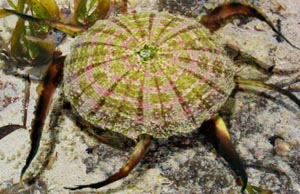Difference between revisions of "Flyx"
m (categories) |
m (→Overview: link) |
||
| Line 1: | Line 1: | ||
==Overview== | ==Overview== | ||
These molluscs are a prized delicacy in the markets Kyŧan towns. They are known to exist exclusively within the river system of the Celvan River. | [[File:flyx.png|left|thumb|300x|Flyx]]These molluscs are a prized delicacy in the markets Kyŧan towns. They are known to exist exclusively within the river system of the Celvan River. | ||
The body of a flyx is covered by a rough pebbly textured convex shell up to 25 cm in diameter. Radially arranged around the edge are six prehensile tentacles reaching double the radius of the body. The mouth, eyes, and stubby swimming tail, are all located under the shell, at the centre of the disc shaped body. | The body of a flyx is covered by a rough pebbly textured convex shell up to 25 cm in diameter. Radially arranged around the edge are six prehensile tentacles reaching double the radius of the body. The mouth, eyes, and stubby swimming tail, are all located under the shell, at the centre of the disc shaped body. | ||
Revision as of 04:41, 17 January 2019
Overview
These molluscs are a prized delicacy in the markets Kyŧan towns. They are known to exist exclusively within the river system of the Celvan River.
The body of a flyx is covered by a rough pebbly textured convex shell up to 25 cm in diameter. Radially arranged around the edge are six prehensile tentacles reaching double the radius of the body. The mouth, eyes, and stubby swimming tail, are all located under the shell, at the centre of the disc shaped body.
These creatures are omnivorous preying upon algae, water plants and small freshwater crustaceans, and fish. Often found in groups of up to a dozen animals. They seem to be hermaphrodites and live birth 3-4 young at semi random intervals related to low population numbers.
The flyx while fairly benign in behaviour, often ignoring other creatures entirely, has a defensive mechanism of jetting ink at predators and escaping while under cover of the cloud generated. This ink is often collected and used by cartographers and other artists, as a water soluble medium. If handled gently they can be lifted from the water without incident.
- Common Names
- <list names the species is referenced by-->
Description
- Classification
- mollusc
- Size
- <--number--> kg (<--number--> pounds), <--height--> m ( <--height--> feet/inches), <length--> as appropriate
- Appearance
- <--general description, include body part ratios as required, consider: skeleton, mobility, body covering, respiratory system, nervous System, additional features-->
- Sexual dimorphism
- <--note differences between the sexes-->
- Variance
- <--any other variance, include subspeciation-->
Ecology
- Habitat
- <--primary and secondary climate and terrain-->
- Diet
- <--what do they eat-->
Behaviour
- Social grouping
- <--herds, pack, solitary, etc-->
- Temperament
- <--skittishness, aggression-->
- Intelligence
- <--apparent intelligence-->
- Reproduction
- <--method, cycles, associated behaviours-->
Sub-Species
<--list of sub-species with notable differences-->
Domestication
- General
- <--brief note about domestication-->
- Resources
- <--resources obtained from domestication-->
See Also
<--links to related material-->
